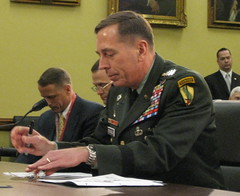Wednesday
May202009
Faulty Buildings Not Bullets Killing American Soldiers
By Jonathan Bronstein, Talk Radio News
Ryan Masseth, a Staff Sergeant in the United States Army, was killed not by an enemy bullet, but by faulty electrical wiring. He was electrocuted while showering on a United States military installation in Baghdad during January 2008.
Yet, the company who wired the building, Kellogg, Brand and Root, also known as KBR, was aware of this issue some 11 months before Staff Sgt. Masseth’s death. The U.S. government recently reclassified Staff Sgt. Masseth’s death as accidental to gross negligence on the part of KBR.
“KBR’s shoddy electrical work wasted tax payer money,” said Senator Frank Lautenberg (D-N.J.) at the Senate Democratic Policy Committee hearing, who continued to say, “and even worse put our service members at risk, sometimes for their lives. 18 people died as a result of this negligence.”
Senator Byron Dorgan (D-N.D.), Chairman of the Senate Democratic Policy Committee, was critical of the government for giving bonuses to KBR from 2004 to 2008 that totaled some $85 million, even though their work failed often to meet even the most basic standards.
The Army’s standard definition for awarding bonuses requires that the contractor's “performance is of the highest quality that could be achieved under the contract. There are no areas of deficiencies or problems encountered during the evaluation period.”
The 2008 edition of the Defense Contract Management Report found that there were 26,205 incidents of improper wiring, 4,571 incidents of outlet box hazards, and 3,201 hazardous switches and fuses. All of these safety deficiencies pose an unneeded threat to American service people, according to Dorgan.
KBR Master Electrician, Eric Peters, estimated that 50 percent of all buildings were not wired properly, and it often took several visits before KBR’s poorly trained electricians could fix the problem. Each one of these visits was charged to the U.S. government, and therefore to the American taxpayer.
Lautenberg attributed KBR’s ability to obtain these large bonuses to the no-bid contracts given to corporations for the reconstruction of Iraq.
“I knew I could no longer work for a company so completely focused on the bottom line they would disregard the safety of their employees and those we were serving: our soldiers,” said Peters, who left KBR two months after being hired.
Jim Childs, another Master Electrician who worked for KBR, had similar gripes with the company and their complete disregard for safety.
“KBR did not do this work to any electrical code,” said Childs.
KBR even attempted to switch to the more lenient British electrical code, but upon re-inspecting the wiring according to the newly implemented standards he still discovered multiple violations.
Childs cited examples of safe buildings that KBR retrofitted and became dangerous, when he said “what had been a safe, properly wired building became a danger to those inside because the re-wiring performed by KBR was not done properly.”
When Childs attempted to solve the wiring problems with quick and cheap solutions, KBR refused to listen and wanted to re-wire the entire building, at the expense of the tax payer.
Childs travelled to Afghanistan to inspect KBR’s work their, but to his dismay, “I found the exact same code violations.”
This wiring situation, according to Childs, is an epidemic that needlessly endangers the lives of American servicemen and women.
Much like its own employees, the Department of Defense is also losing confidence in KBR’s ability.
Captain David Graff, Commander of Defense Contract Management Agency, said that “Many within the Department of Defense have lost or are losing all remaining confidence in KBR’s ability to successfully and repeatedly perform the required electrical support services mission in Iraq.”
Ryan Masseth, a Staff Sergeant in the United States Army, was killed not by an enemy bullet, but by faulty electrical wiring. He was electrocuted while showering on a United States military installation in Baghdad during January 2008.
Yet, the company who wired the building, Kellogg, Brand and Root, also known as KBR, was aware of this issue some 11 months before Staff Sgt. Masseth’s death. The U.S. government recently reclassified Staff Sgt. Masseth’s death as accidental to gross negligence on the part of KBR.
“KBR’s shoddy electrical work wasted tax payer money,” said Senator Frank Lautenberg (D-N.J.) at the Senate Democratic Policy Committee hearing, who continued to say, “and even worse put our service members at risk, sometimes for their lives. 18 people died as a result of this negligence.”
Senator Byron Dorgan (D-N.D.), Chairman of the Senate Democratic Policy Committee, was critical of the government for giving bonuses to KBR from 2004 to 2008 that totaled some $85 million, even though their work failed often to meet even the most basic standards.
The Army’s standard definition for awarding bonuses requires that the contractor's “performance is of the highest quality that could be achieved under the contract. There are no areas of deficiencies or problems encountered during the evaluation period.”
The 2008 edition of the Defense Contract Management Report found that there were 26,205 incidents of improper wiring, 4,571 incidents of outlet box hazards, and 3,201 hazardous switches and fuses. All of these safety deficiencies pose an unneeded threat to American service people, according to Dorgan.
KBR Master Electrician, Eric Peters, estimated that 50 percent of all buildings were not wired properly, and it often took several visits before KBR’s poorly trained electricians could fix the problem. Each one of these visits was charged to the U.S. government, and therefore to the American taxpayer.
Lautenberg attributed KBR’s ability to obtain these large bonuses to the no-bid contracts given to corporations for the reconstruction of Iraq.
“I knew I could no longer work for a company so completely focused on the bottom line they would disregard the safety of their employees and those we were serving: our soldiers,” said Peters, who left KBR two months after being hired.
Jim Childs, another Master Electrician who worked for KBR, had similar gripes with the company and their complete disregard for safety.
“KBR did not do this work to any electrical code,” said Childs.
KBR even attempted to switch to the more lenient British electrical code, but upon re-inspecting the wiring according to the newly implemented standards he still discovered multiple violations.
Childs cited examples of safe buildings that KBR retrofitted and became dangerous, when he said “what had been a safe, properly wired building became a danger to those inside because the re-wiring performed by KBR was not done properly.”
When Childs attempted to solve the wiring problems with quick and cheap solutions, KBR refused to listen and wanted to re-wire the entire building, at the expense of the tax payer.
Childs travelled to Afghanistan to inspect KBR’s work their, but to his dismay, “I found the exact same code violations.”
This wiring situation, according to Childs, is an epidemic that needlessly endangers the lives of American servicemen and women.
Much like its own employees, the Department of Defense is also losing confidence in KBR’s ability.
Captain David Graff, Commander of Defense Contract Management Agency, said that “Many within the Department of Defense have lost or are losing all remaining confidence in KBR’s ability to successfully and repeatedly perform the required electrical support services mission in Iraq.”





 Wednesday, May 20, 2009 at 2:48PM
Wednesday, May 20, 2009 at 2:48PM


Army's High Suicide Rate Attributed To Risky Activities, Permissive Environment
A new report lays partial responsibility for the spike in the Army’s suicide rate on a permissive environment that facilitates risky behavior within military units .
The report, compiled by the Army over a 15-month period, zeroes in on the 239 suicides that occurred among active and reserve soldiers in 2009, and links most of these deaths to high-risk activities, such as drug use and binge drinking.
Unit leadership is cited as a contributing cause for the rise in dangerous behavior.
“Institutional education and experiential knowledge of good order and discipline processes in a garrison environment have atrophied among leaders who have operated only in an Army at war,” the report states. “Leaders are consciously and admittedly taking risk by not enforcing good order and discipline.”
The lack of enforcement may in part be tied to the personnel demands posed by the wars in Iraq and Afghanistan. According to the report, since 2001, when combat began in Afghanistan, 25,283 soldiers who committed offenses that would have resulted in discharge in previous years remained in service.
Speaking at a briefing at the Pentagon Thursday, General Peter Chiarelli, the Vice Chief of Staff for the Army, stressed that the Army is pursuing a number of mitigating steps, including better methods to detect and combat drug and alcohol abuse, eliminating the stigma of seeking treatment, instructing officers to keep a closer watch on their units and increasing resiliency among soldiers entering their first tours. The report includes a total of 250 recommendations.
The report in its entirety can be found here.